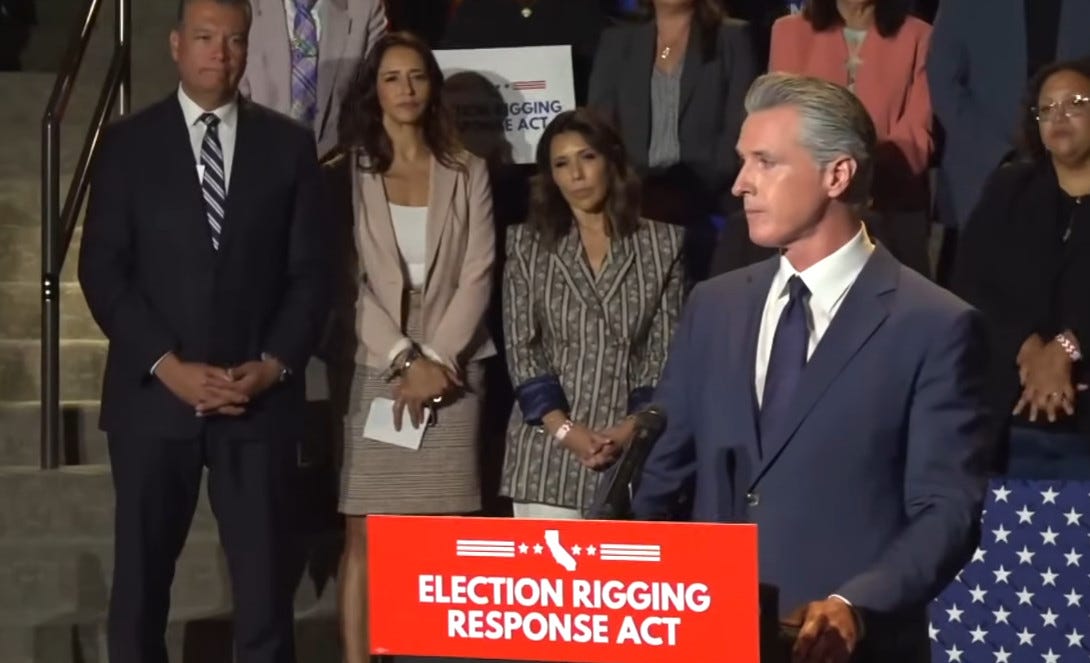I'm against gerrymandering, but I support Gavin Newsom's California plan
Democrats cannot afford unilateral disarmament against Republican map-rigging
In service of Donald Trump and the national Republican Party, the Texas House has rammed through an aggressively partisan redistricting map, one designed not to reflect the will of voters but to manufacture congressional seats out of thin air. With the stroke of a pen, Republicans can conjure up five new House seats before a single ballot is cast in 2026. This is gerrymandering at its purest: rigging the rules of the game so you rarely lose.
For Democrats, the dilemma is familiar. They can denounce the practice, file lawsuits, and hold candlelight vigils for democracy while Republicans lock in power, or they can meet force with force. California is signaling it will not sit back. Governor Gavin Newsom is spearheading a plan to redraw California’s congressional maps mid-decade, in direct response to what Texas has done. The proposal could flip up to five Republican-held seats into Democratic hands. “It’s temporary, it’s transparent, and it’s democratic,” Newsom told me in our recent conversation. The maps would only apply in 2026, 2028, and 2030, before reverting back to California’s independent redistricting commission.
This is not symbolic saber-rattling. It is a counterstrike. It’s an acknowledgment that unilateral disarmament in the face of Republican hardball is political suicide. I would abolish partisan gerrymandering nationwide tomorrow if I could. Newsom says he would too, and California will put support for national independent redistricting directly on the ballot this November. But we don’t live in that world. We live in a world where Texas, Florida, Missouri, and Indiana are all willing to redraw maps to entrench minority rule. In that world, Democrats who refuse to play are not taking the moral high ground. They’re forfeiting the game.
There are legitimate concerns that tit-for-tat gerrymandering could spiral into an arms race that ultimately benefits Republicans. Analysts like Dave Wasserman have pointed out that blue states have limited room to maneuver—Illinois is tapped out, New York is hemmed in by legal constraints, and smaller Democratic states simply lack the population to counterbalance Republican strongholds. If everyone pushes their maps to the max, Republicans may still end up ahead. But as Newsom made clear, that uncertainty cannot justify doing nothing. “If we don’t do it, they will do it, they’ve done it, and they will continue to do more,” he said. At the very least, California can blunt the Texas advantage and set an example for other Democratic states to follow.
The governor also framed this fight in starker terms than the usual back-and-forth over district lines. He connected gerrymandering to the broader authoritarian project Trump and his allies are pursuing: voter suppression, intimidation tactics, and laying the groundwork to declare elections illegitimate when they lose. “You’re quite literally putting the rule of law and substituting the rule of Don,” Newsom said, warning that redistricting is just one front in a larger assault on democratic norms. His rhetoric may sound dramatic, but recent history bears him out. Trump tried to overturn the 2020 election. He pressured state officials to “find” votes. He incited January 6. To think he wouldn’t weaponize redistricting and census counts is to ignore the lessons of the last decade.

Critics on the right are already mocking California’s plan. Newsom insists this mockery is evidence the pressure is working. “These are acts of weakness masquerading as strength,” he told me, noting that intimidation tactics, like ICE officers showing up at one of his press conferences, reflect desperation, not confidence. In his view, Democrats need to meet Trump’s culture-war theatrics with a willingness to punch back, even with humor. “We can no longer screw around,” he said bluntly.
The broader principle at stake is whether Democrats are willing to wield power to secure the conditions for democracy to survive. Gerrymandering is not pretty, nor is it fair. But when one side abuses it relentlessly, refusing to respond is tantamount to surrender. The moral high ground does not count for much if you are permanently locked out of governing. Sometimes you need power first to make reform possible. Newsom sees California’s move as precisely that: a temporary, transparent strike meant to neutralize Texas and preserve the chance to ban partisan maps altogether in the future.
There are no guarantees this will succeed. California voters could reject the proposal. Other Democratic states might refuse to follow suit. And yes, Republicans may ultimately benefit more from a nationwide gerrymander-fest. But the alternative of doing nothing is a guarantee of defeat. If Democrats allow Texas and other red states to tilt the House map without response, they are effectively conceding the chamber for the rest of the decade.
What comes next will depend not only on California but on whether Democrats across the country internalize the lesson. Power cannot be preserved by wishing away an opponent’s abuses. It must be defended, exercised, and when necessary used to change the rules so that democracy itself has a fighting chance. Republicans have made their move. Now it is up to Democrats to decide whether they will make Texas regret it.



You can't beat Trump playing by the rules you have to rig the system the same way he does. He threw the playbook out the window. His kakistocracy has to be met with similar responses. The time for "playing nice" has long since passed.
Sometimes we have to fight fire with fire. This is one instance.